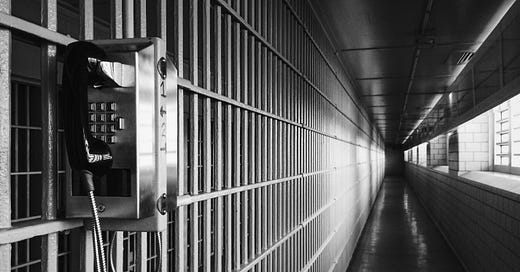Being deaf in prison
Prison can be a highly challenging environment for someone with a hearing impairment. Despite this, there is little support or assistance on offer.
More than a decade ago, a study found that just under 95% of First Nations people in prison in the Northern Territory had significant hearing loss.
In Western Australia, a survey of just over 200 people at Bunbury Regional Prison found that a third reported having a hearing difficulty.
Despite the disproportionate number of people with hearing impairments in prisons - which becomes even more stark when it comes to First Nations people - there have been little adaptations of custodial facilities and practices to assist these people.
Prisons are highly challenging environments for people with hearing difficulties, with a reliance on spoken communication and loudspeaker announcements.
And an inability to understand instructions can lead to those with hearing impairment being misinterpreted as being difficult and obstructive, leading to poor treatment and wrongful punishment.
The prison environment is also centred around verbal instructions, loudspeaker announcements, alarm and alerts and routine daily activities.
“Custodial facilities are sensory environments where day-to-day living often requires high levels of mobility and the ability to effectively communicate and observe what is happening,” a WA Office of the Inspector of Custodial Services (OICS) report on people in custody with hearing impairment found in 2023.
“Often the physical environment struggles to cater for people with mobility or vision impairments, particularly in older facilities.”
This OICS report found that while there had been improvements at the time, there were still significant issues in the screening of individuals for hearing issues when they enter prison, and in the support that is offered to those with such an impairment.
It found that it was very rare for somebody in prison to be provided assistance in purchasing hearing aids when they need them, and those in prison are ineligible for a federal government voucher scheme for hearing aids.
First Nations people have higher rates of hearing issues and impairments, and are disproportionately represented in Australia’s prison population. It’s estimated that about 3.6 million people in Australia experience some level of hearing loss, whether temporarily or permanently.
The National Aboriginal and Torres Strait Islander Health Survey 2018-19 found that 43% of First Nations people aged seven and over had hearing loss in one or both ears, while just under 30% of children aged 7 to 14 years old had hearing loss in one or both ears.
The study also found that more than 80% of First Nations adults aged 55 years and older had hearing loss in one or both ears.
There has been research conducted into the link between hearing loss and an involvement in the criminal justice system too. Hearing difficulties can impact a young person’s learning, self-esteem and social risks - all factors that can increase the likelihood that an individual is incarcerated.
In public prisons in WA, the OICS report found that despite the state government implementing a new functional impairment screening tool, very few people were being identified with hearing impairments.
From 2018 to 2023, just 160 people in custody were identified as having hearing difficulty, a figure that doesn’t align with the prevalence of hearing loss in the community or previous studies in the proportion of people with hearing difficulties in prisons.
The report also found that individuals with an identified hearing impairment have been provided with support to access hearing aids on a “few rare occasions”.
A recommendation by the inspector for the WA government to provide subsidised hearing aids to people in prison was rejected and has not been implemented in the years since the report.
The WA government will consider funding assistance for individuals to access hearing aids in prison on a case-by-case basis, with no specific criteria in place. In the five years to 2023, just two people requested and received fully subsidised hearing aids.
The situation is similar in New South Wales, with the provision of hearing aids determined by Corrections.
In contrast, the privately run Acacia Prison offers fully-subsidised hearing aids to people in prison, along with free hearing tests.
People in prison are ineligible for the federal government’s Hearing Services Program, which provides vouchers for hearing aids and other supports. Someone in prison must have had a valid voucher before they were incarcerated in order to access this scheme.



